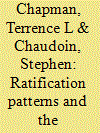| Srl | Item |
| 1 |
ID:
188065


|
|
|
|
|
| Summary/Abstract |
Increasing levels of extreme weather patterns and environmental deterioration pose pertinent threats to the availability of essential resources, such as food and water. Past research has found a positive association between climate change and the likelihood of internal conflicts, especially in developing countries. We argue that intensifying climate events can lead to an increase in the spread and intensity of both left and right-wing ideologically motivated violence in developed countries as well, specifically the United States. We also focus on how regional environmental characteristics might be correlated to the geographical distribution of domestic political violence. Our findings suggest that while both far-right and environmental violence are more prevalent during warmer seasons and extreme warming weather events, such as heat waves, political and demographic factors also need to be considered. We also found a strong linkage between man-made ecological damage, as opposed to natural disasters, and the prevalence of eco-violence incidents, especially in states that have a progressive-liberal political culture and high levels of ecological exploitation. We conclude with a brief discussion of findings and suggestions for future research.
|
|
|
|
|
|
|
|
|
|
|
|
|
|
|
|
| 2 |
ID:
120879


|
|
|
|
|
| Publication |
2013.
|
| Summary/Abstract |
What types of countries have ratified the Rome Statute establishing the International Criminal Court? Because the court relies on state cooperation, it is a good example of a regime facing a "participation problem." In order to be effective, the regime requires active members, but states that fear regime effectiveness will therefore find it potentially costly to join. We analyze the extent to which this problem plagues the ICC. We find that countries for whom compliance is likely to be easiest-democracies with little internal violence-are the most likely countries to join the ICC. On the other hand, countries with the most to fear from ICC prosecution, nondemocracies with weak legal systems and a history of domestic political violence, tend to avoid ratification. We contrast our findings with those of a recent article by Simmons and Danner (2010), arguing that ratification patterns show evidence of credible commitments. Our analysis across a breadth of evidence, both descriptive and multivariate, suggests caution toward arguments about the impact of the ICC on global practices and provides support for the notion that states strategically select themselves into supranational judicial agreements.
|
|
|
|
|
|
|
|
|
|
|
|
|
|
|
|